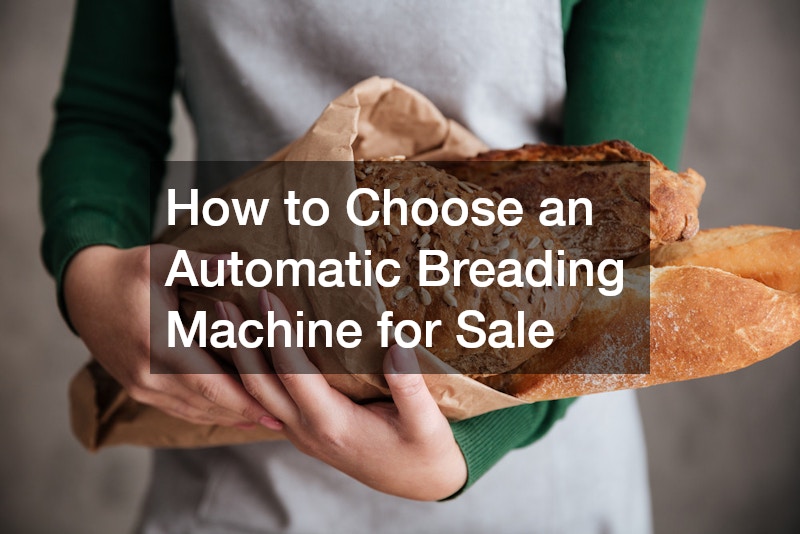Understanding the necessity and functionality of an automatic breading machine is essential for businesses in the food industry looking to optimize efficiency. This article provides guidance on making an informed choice when looking for an automatic breading machine for sale. By considering specific factors and features, businesses can enhance productivity and ensure their investment effectively meets the demands of their operations.
What Are the Key Features to Look for in an Automatic Breading Machine?
Size and Capacity
The size and capacity of the machine need to align with your production requirements, reflecting on both space availability and batch size needs. Larger machines are suitable for high-volume productions, while smaller machines are more appropriate for limited space and moderate demand.
Evaluating your current and future production needs will help determine the optimal size and ensure efficient operation.
It’s important to measure the available space in your facility before purchasing to avoid any spatial issues. An automatic breading machine that fits comfortably within your workspace will allow for smoother integration into your production line. Furthermore, considering potential growth or demand fluctuations will enable you to choose a machine that accommodates future needs.
A machine with the right capacity streamlines your production process by minimizing the need for frequent batch refills. This increased efficiency can lead to cost savings in both time and labor, directly impacting profit margins. Investing in the correct capacity ensures consistent product quality while maximizing throughput.
Material and Durability
Consider the materials used in construction, as well as the durability, to ensure the machine can withstand regular use and rigorous cleaning. Stainless steel is a favored material due to its resistance to corrosion and ease of cleaning, aligning with the hygienic standards in food production. A durable construction will also mean fewer repairs and extended machine lifespan, maximizing your return on investment.
Durability is a critical factor because it significantly impacts the reliability of your production process. Machines that are made from high-quality materials typically operate more efficiently and experience less downtime. Investing in a durable machine results in fewer interruptions which, in turn, ensures a steady production flow.
Regular usage and cleaning can wear down inferior machines, leading to costly replacements or repairs. Selecting a machine built from robust materials reduces these risks, maintaining operational efficiency over a prolonged period. Durability also contributes to overall machine safety, protecting workers and maintaining compliance with health regulations.
Ease of Use and Maintenance
Choosing a machine that is user-friendly with straightforward maintenance processes will reduce downtime and enhance productivity. Machines designed with intuitive interfaces ease the learning curve for operators, facilitating quick integration into your workflow. Streamlined maintenance procedures prevent unnecessary delays, ensuring production does not suffer.
User-friendly designs often include clear instructions and labeling, allowing operators to manage the machine with minimal training. Additionally, simple maintenance routines mean less time spent on upkeep and more time dedicated to production. When machines are easy to use and maintain, it enhances productivity and reduces labor costs.
Advanced features like automated cleaning cycles or accessible parts further simplify the maintenance process. These features ensure that even detailed cleaning is completed quickly, maintaining hygiene without significant interruptions. Efficiency in both operation and maintenance enables seamless production, promoting consistent output quality and quantity.
How Do Different Models and Brands Compare?
Brand Reputation and Reviews
Evaluating brand reputation and customer reviews can help you gauge reliability, quality, and customer support provided by different manufacturers. Positive reviews often indicate dependable performance and satisfactory after-sales service, giving you peace of mind in your purchase decision. Established brands are generally more reliable, as their reputation relies on delivering consistent quality and support.
Peer recommendations and third-party certifications can also influence your decision by providing unbiased insight into the machine’s performance. Browsing through various forums or user groups can expose common issues or advantages that may not be evident from manufacturer specifications alone. A well-regarded brand not only enhances production reliability but assures support in times of need.
Consistent positive reviews can affirm that a brand stands by its products, instilling confidence in potential buyers. It’s significant to verify reviews’ authenticity to ensure accurate feedback on your potential purchase. Thorough research into brand reputation offers a comprehensive view of overall product satisfaction and manufacturer accountability.
Cost vs. Value
Analyzing price against the features and benefits offered can help determine the true value of the machine in relation to your budget. While lower-cost machines might seem appealing initially, they may lack essential features or durability, leading to higher costs in the long run. Weighing initial investment against anticipated maintenance and operational costs can illuminate the most financially sound option.
High upfront costs might include advanced features that enhance efficiency and reduce variable costs such as labor or waste, providing greater value over time. Machines that offer superior technology or quality could result in better product consistency and lower operational expenses. Balancing cost and value ensures the machine not only fits your budget but also enhances overall production profitability.
It’s crucial to assess total cost of ownership, which includes purchase price, operating costs, and potential downtime expenses. Opting for a slightly more expensive machine with long-term benefits can offer considerable savings, impacting your business positively. Making a well-rounded appraisal of cost and value ensures a strategic investment that supports profitable operations.
Warranty and Support Services
It’s important to consider the warranty and after-sales support services provided by the manufacturer to safeguard your investment. Comprehensive warranties cover various potential malfunctions, protecting against undue repair costs and ensuring long-term operational stability. Exceptional support services often indicate a manufacturer’s commitment to consumer satisfaction and product reliability.
Manufacturers with reliable support services can swiftly address issues, minimizing downtime and maintaining production integrity. Access to expert technical assistance can provide invaluable troubleshooting guidance, ensuring continuous machine performance. When support is prompt and knowledgeable, it fortifies trust in the brand’s commitment to product excellence.
A robust warranty also serves as reassurance that the manufacturer has confidence in their product’s durability and performance. Engaging with brands that offer comprehensive support and warranties can significantly reduce operational risks. Evaluating these factors offers peace of mind, knowing your investment is well-protected and supported throughout its lifecycle.
Choosing the right automatic breading machine involves careful consideration of its features, brand reputation, and overall value. With these insights, buyers can make a well-informed decision that best meets their production needs and budget constraints. Ultimately, an informed choice in selecting an automatic breading machine enhances productivity, operational efficiency, and business profitability.
.



















